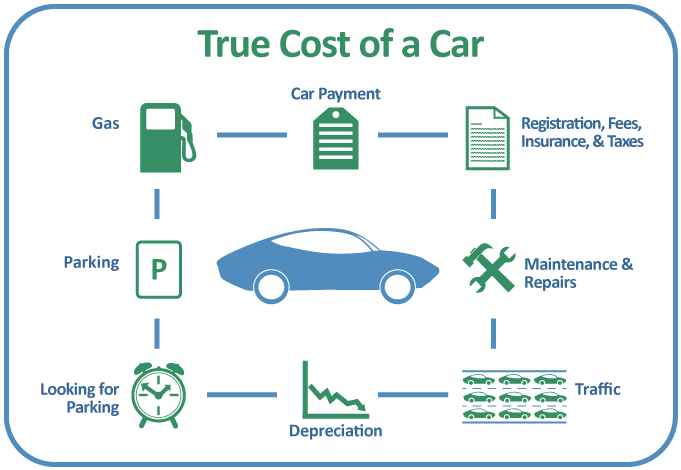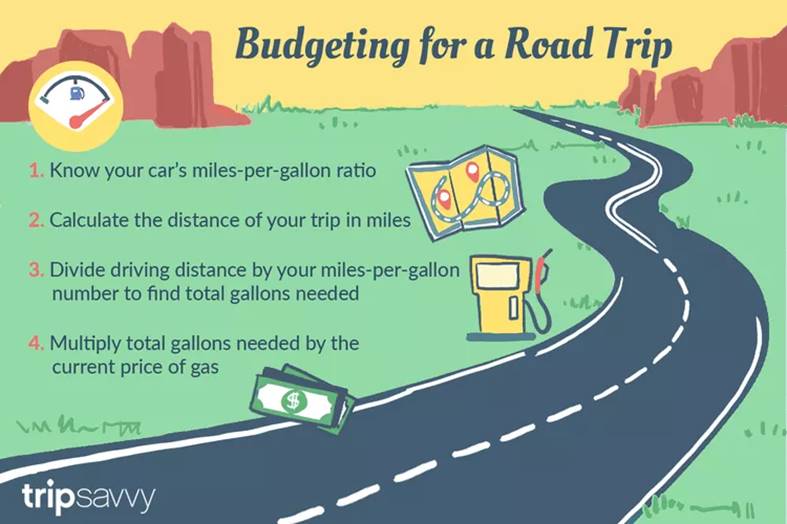
The True Cost of Car
Ownership
Learning
Objective
The student will be able to calculate their monthly payment based on financing options, estimate vehicle registration costs, title fees, and sales tax, understand the need for and cost of car insurance, accurately determine and budget for common maintenance costs, and estimate monthly fuel consumption and budget.

When it comes to owning a car, the sticker
price is just the beginning. This lesson aims to equip students with the
knowledge and tools to understand the true cost of purchasing and maintaining a
car. By focusing on smart budgeting, students will learn to anticipate both
expected and unexpected costs associated with car ownership.
Understanding Car Financing
Car financing is a common method used to purchase a vehicle when you don't have enough cash to pay the full price upfront. This process involves taking a loan, which is then repaid in monthly installments over a set period. Understanding how car financing works is crucial for anyone considering buying a car through a loan.
The Basics of Car Financing
Car financing is
essentially a loan. Like any loan, it has three main components: the principal
amount, the interest rate, and the loan term.
1.
Principal: This is the total amount of money you borrow.
2.
Interest Rate: The lender charges this as a percentage of the principal. It can be
fixed or variable.
3.
Loan Term: This is the duration over which you will repay the loan, typically in
months or years.
Calculating Monthly Payments
Your monthly car loan
payment depends on the loan amount, the interest rate, and the loan term. The
formula to calculate the monthly payment is:

Where:
·
P is the principal amount (loan amount)
·
r is the monthly interest rate (annual interest rate divided by 12)
·
n is the total number of payments (loan term in months)
Understanding this
calculation is important to determine how much you'll pay each month and
whether it fits into your budget.
Interactivity: Car Loan Calculator
Now let's put this
knowledge into practice with an interactive car loan calculator. You can input
different loan amounts, interest rates, and terms to see how they affect your
monthly payment.
Owning a car involves
various expenses beyond the initial purchase price. Among these are vehicle
registration, title fees, and sales tax. It's important for potential car
owners, especially those budgeting for their first vehicle, to understand and
estimate these costs.
Vehicle Registration
Vehicle registration
is the process of registering your vehicle with the state’s department of motor
vehicles (DMV). This registration proves your legal ownership and allows the
vehicle to be driven on public roads.
Cost Factors:
·
Vehicle Type: Different types of
vehicles may have different registration fees.
·
Vehicle Age: Some states charge
different fees based on the age of the vehicle.
·
Vehicle Weight: Heavier vehicles
may incur higher registration fees.
Title Fees
The title fee is the
cost for the vehicle’s title, a legal document proving ownership.
Typical Costs:
·
The cost for a title varies by state
and sometimes by the value or age of the vehicle.
Sales Tax
Sales tax is a
percentage of the purchase price of the vehicle, charged by most states.
Estimation:
·
Sales tax is calculated as a
percentage of the vehicle’s purchase price.
·
The rate varies by state and sometimes
by locality within the state.
Interactive Estimator: Vehicle Costs Calculator
This calculator will
allow students to input the vehicle's value and select their state to estimate
registration costs, title fees, and sales tax.
The Necessity and Cost of Car Insurance
Car insurance is a
critical component of vehicle ownership. It serves as a financial safeguard
against potential losses due to accidents, theft, or damage. Understanding the
necessity and factors affecting the cost of car insurance is vital for every
driver.
Car insurance
provides financial protection in case you’re involved in an accident. It can
cover repair costs, medical expenses, and legal fees, depending on the
coverage. Most states require drivers to
have at least a minimum level of liability insurance. This insurance pays for
any damage or injuries you may cause to others in an accident.
Factors Affecting Insurance Cost
1.
Driver’s Age: Younger drivers typically face higher premiums due to their
inexperience, while older, more experienced drivers tend to have lower rates.
2.
Driving Record: A history of accidents or traffic violations can increase your
insurance premiums.
3.
Location: Insurance costs can vary depending on where you live due to factors
like accident rates, car thefts, and repair costs in the area.
4.
Type of Vehicle: More expensive vehicles generally cost more to insure. Also, cars with
good safety records may have lower insurance costs.
Interactive Feature: Car Insurance Cost Estimator
This tool allows
students to input different variables and get an estimated insurance cost.
Budgeting for Common Maintenance Costs
Regular maintenance is crucial for keeping a car in good working condition and ensuring safety on the road. Understanding and budgeting for these maintenance costs is an essential part of responsible car ownership.
Typical Maintenance Items
1.
Oil Changes: Necessary for lubricating engine parts and keeping the engine running
smoothly. Typically required every 3,000 to 5,000 miles.
2.
Tire Rotations: Helps in even tire wear, extending the life of the tires. Recommended
every 6,000 to 8,000 miles.
3.
Brake Pad Replacements: Essential for safe driving. Brake pads need replacement every 20,000 to
25,000 miles, depending on driving habits.
4.
Unexpected Repairs: These can include issues with the engine, transmission, or other parts
of the car and can vary widely in cost.
Budgeting Strategy
To budget for
maintenance costs:
·
Research Average Costs: Look up the average
costs for these services for your specific car model.
·
Set Aside Monthly Amounts: Divide the total
estimated annual maintenance cost by 12 to determine how much to save each
month.
·
Emergency Fund: It's also a good idea to have an
emergency fund for unexpected repairs.
Interactive Feature: Maintenance Cost Calculator
This calculator allows users to input their car model and mileage to get an estimated maintenance budget.
Fuel costs are a
significant part of the monthly expenses for car owners. Estimating and
budgeting for fuel consumption is essential for effective financial planning.
Understanding your car's fuel efficiency and your driving habits can help you
accurately estimate these costs.

Miles Per Gallon (MPG):
This rating indicates
how many miles a car can travel on one gallon of fuel. Higher MPG means better
fuel efficiency. You can typically find this information in your car's manual
or online.
Fuel Cost Calculation
To estimate your
monthly fuel cost:
1.
Estimate Monthly Driving Distance: Calculate or estimate the total number of miles you drive in a month.
2.
Divide by MPG: Divide this number by your car's MPG rating to find out how many
gallons of fuel you'll need for the month.
3.
Multiply by Fuel Price: Multiply the number of gallons by the current price per gallon to
estimate your monthly fuel cost.
Interactive Feature: Fuel Cost Calculator
This tool allows users
to input their car's MPG, their estimated monthly mileage, and the current fuel
price to get an estimated monthly fuel cost.
<
Activity: The True Cost of Car Ownership
Students will use
interactive tools to calculate and understand the various costs associated with
owning and maintaining a car based on a given scenario.
Scenario
You have just
graduated and landed your first job. You're planning to buy a car to commute to
work and for personal use. The car you're interested in has a sticker price of
$25,000. You live in a state with a 6% sales tax rate, and the average vehicle
registration and title fees in your area are $200 and $50, respectively. Your
annual mileage estimate is 15,000 miles. Assume you've found a car loan with a
5% interest rate for a 5-year term.
Instructions
1.
Car Loan Calculator
·
Use the Car Loan Calculator to determine
your monthly car payment.
·
Enter the following details:
o
Loan Amount: $25,000
o
Annual Interest Rate: 5%
o
Loan Term: 5 years
2.
Vehicle Costs Estimator
·
Calculate the initial costs including
sales tax, registration, and title fees.
·
Enter the following details:
o
Vehicle Value: $25,000
o
Sales Tax Rate: 6%
o
Estimated Registration Fee: $200
o
Estimated Title Fee: $50
3.
Car Insurance Cost
Estimator
·
Estimate the annual cost of car
insurance. Assume you are a 23-year-old living in an urban area with a clean
driving record and the car is a standard model.
·
Use the Car Insurance Cost Estimator
with appropriate values.
4.
Maintenance Cost
Calculator
·
Calculate the estimated annual and
monthly maintenance costs based on your annual mileage.
·
Enter an Annual Mileage of 15,000
miles in the Maintenance Cost Calculator.
5.
Fuel Cost Calculator
·
Estimate your monthly fuel costs.
Assume the car's MPG is 25 and the current fuel price is $3 per gallon.
·
Enter the details in the Fuel Cost
Calculator.
Task Completion
Use the following
document to complete this task.
True
Cost of Car Ownership Activity
·
After using each tool, record the
calculated amounts in a table.
·
Sum up the monthly costs (loan
payment, insurance, maintenance, fuel) to find the total monthly cost of owning
the car.
·
Reflect on the costs: Were they higher
or lower than expected? How could these costs impact your monthly budget?
Reflection
Write a short
reflection on your findings. Consider the following questions:
·
How does understanding these costs
influence your decision about buying a car?
·
What factors would you consider most
important in the future when purchasing a vehicle?
Submission
Submit the completed
calculations and your reflection essay.